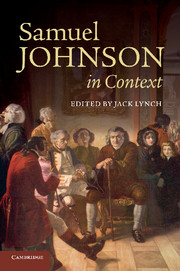Book contents
- Frontmatter
- Contents
- Illustrations
- Contributors
- Preface
- Chronology
- Abbreviations
- Part I Life and works
- Part II Critical fortunes
- Part III Contexts
- Chapter 10 America
- Chapter 11 Anglicanism
- Chapter 12 Anthropology
- Chapter 13 Authorship
- Chapter 14 Biography
- Chapter 15 Book trade
- Chapter 16 Clubs
- Chapter 17 Conversation
- Chapter 18 Dictionaries
- Chapter 19 Domestic life
- Chapter 20 Education
- Chapter 21 Empire
- Chapter 22 Essays
- Chapter 23 Fiction
- Chapter 24 History
- Chapter 25 Journalism
- Chapter 26 Law
- Chapter 27 Literary criticism
- Chapter 28 London
- Chapter 29 Medicine
- Chapter 30 Mental health
- Chapter 31 Money
- Chapter 32 Nationalism
- Chapter 33 Philosophy
- Chapter 34 Poetry
- Chapter 35 Politics
- Chapter 36 Scholarship
- Chapter 37 Science and technology
- Chapter 38 Scotland
- Chapter 39 Sermons
- Chapter 40 Shakespeare
- Chapter 41 Slavery and abolition
- Chapter 42 Social hierarchy
- Chapter 43 Theatre
- Chapter 44 Travel
- Chapter 45 Visual arts
- Chapter 46 War
- Chapter 47 Women writers
- Further reading
- Index
- References
Chapter 41 - Slavery and abolition
from Part III - Contexts
Published online by Cambridge University Press: 05 June 2012
- Frontmatter
- Contents
- Illustrations
- Contributors
- Preface
- Chronology
- Abbreviations
- Part I Life and works
- Part II Critical fortunes
- Part III Contexts
- Chapter 10 America
- Chapter 11 Anglicanism
- Chapter 12 Anthropology
- Chapter 13 Authorship
- Chapter 14 Biography
- Chapter 15 Book trade
- Chapter 16 Clubs
- Chapter 17 Conversation
- Chapter 18 Dictionaries
- Chapter 19 Domestic life
- Chapter 20 Education
- Chapter 21 Empire
- Chapter 22 Essays
- Chapter 23 Fiction
- Chapter 24 History
- Chapter 25 Journalism
- Chapter 26 Law
- Chapter 27 Literary criticism
- Chapter 28 London
- Chapter 29 Medicine
- Chapter 30 Mental health
- Chapter 31 Money
- Chapter 32 Nationalism
- Chapter 33 Philosophy
- Chapter 34 Poetry
- Chapter 35 Politics
- Chapter 36 Scholarship
- Chapter 37 Science and technology
- Chapter 38 Scotland
- Chapter 39 Sermons
- Chapter 40 Shakespeare
- Chapter 41 Slavery and abolition
- Chapter 42 Social hierarchy
- Chapter 43 Theatre
- Chapter 44 Travel
- Chapter 45 Visual arts
- Chapter 46 War
- Chapter 47 Women writers
- Further reading
- Index
- References
Summary
SLAVE. n.s. [esclave, French. It is said to have its original from Slavi, or Sclavonians, subdued and sold by the Venetians.] One mancipated to a master; not a freeman; a dependant.
The condition of servants was different from what it is now, they being generally slaves, and such as were bought and sold for money. South.
Johnson’s lifetime coincided almost exactly with the rise and fall of the British slave trade. Some Britons had been involved in slave trading as early as the sixteenth century, but for most of the sixteenth and seventeenth centuries Great Britain was a relatively minor participant. Britain signaled its intention to make serious money from slave trading with the establishment of the Royal Adventurers into Africa in 1660. This company, which genuinely was led by members of the restored royal family, shortly after became the Royal African Company.
The asiento
It was not until the early eighteenth century, however, that Britain wrested control of the slave trade from the Spanish, who had dominated slave trading throughout the seventeenth century. The turning point was the War of the Spanish Succession (1701–14). On the face of it this was a dynastic conflict, which contemporaries knew would determine the balance of power in Europe, but in the event it would also determine the relationship between Europe, Africa, and the New World for the rest of the eighteenth century and, arguably, for much longer. The war was concluded with the Peace of Utrecht (1713). As part of the negotiations towards this treaty, Spain granted Britain the right to supply its colonies in the New World with slaves, an agreement known as the asiento. From this point onwards, Britain became the foremost slave-trading nation, a position it continued to occupy until it voluntarily abolished its slave trade in 1807.
- Type
- Chapter
- Information
- Samuel Johnson in Context , pp. 352 - 359Publisher: Cambridge University PressPrint publication year: 2011



